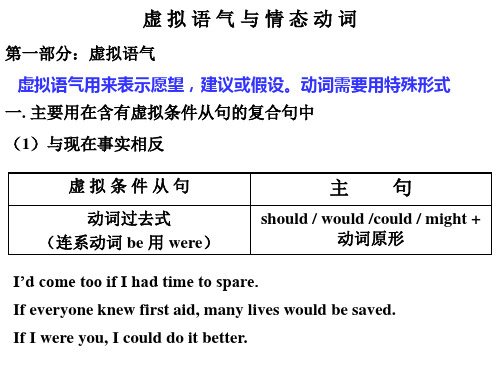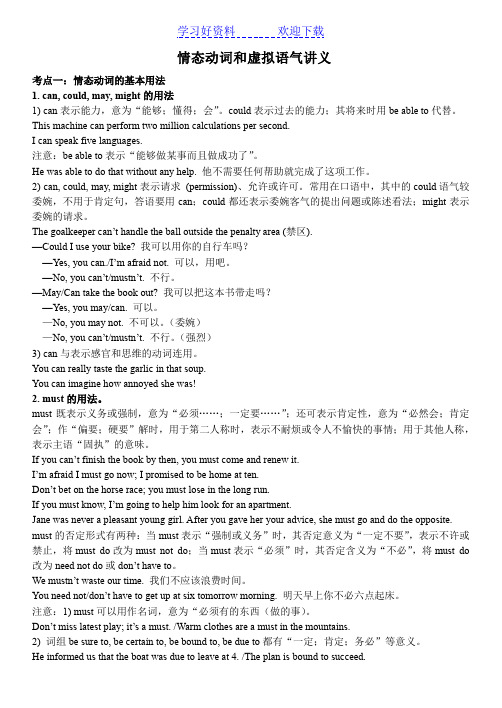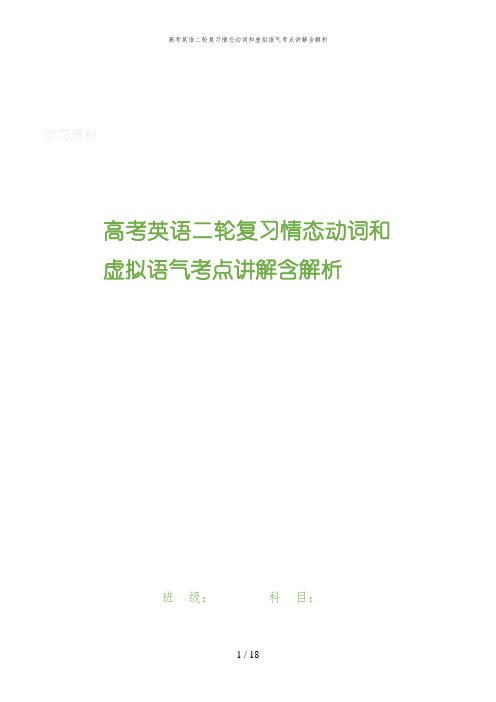情态动词与虚拟语气知识点讲解
高中英语语法系统讲解之八情态动词和虚拟语气

高中英语语法系统讲解之八情态动词和虚拟语气情态动词一. 情态动词的类型和特征1. 类型○1只作情态动词用的有:can(could),may(might),must,ought to。
○2可作情态动词也作实义动词的有:need,dare。
○3可作情态动词也作助动词的有:shall(should),will(would)。
○4具有情态动词某些特征的有:have(had)to,used to。
2. 特征情态动词有一定的词义,但不能单独作谓语,须和实义动词或系动词连用,构成谓语;且适用于主语的各种人称和数(have to例外),主语是第三人称单数时,要用has to。
二. 情态动词的基本用法1. can与could○1表示能力或客观可能性,还可表示请求和允许,她存在以下几种形式:如Children can be troublesome sometimes.○2表示惊异、推测、怀疑、不相信的态度(主要用于否定句、疑问句中)。
如This can’t be done by him.○3can的习惯用法A. can but的用法can but“只好,至多不过”,如We can but do our best.B. cannot help but,cannot help的用法二者都表示“不得不;不能避免;不禁”;但前者后加动词原形,后者加代词或动名词等。
如The girl couldn’t help but live on herself.When I try to speak, I can’t help making mistakes.C. cannot … too“无论怎样……都不过分;越……越好”如We can’t thank you too much for what you have done for us。
We can not be too careful to cross the road.温馨提示:○1can与be able to:can表示有能力做某事,be able to表示通过努力、克服困难做成某事。
虚拟语气与情态动词语法讲解

Would you mind turning the light on? Could you come a little earlier next time?
(3)提出建议或劝告 You had better leave the matter to me. You’d better not go shopping everyday. Perhaps you could get better results this way.
虚 拟条件句
动词过去式 或 should + 动词原形 或 were to + 动词原形
主
句
should / would / could / might + 动词原形
If it were to rain tomorrow, we should not go out. If they should farm the land themselves, they would get more grain.
B)在目的状语从句中总是有一个情态动词 The teacher spoke slowly in order that the students could hear clearly.
C)以 lest(唯恐) for fear that(以免) 和 in case(万一) 引 起的条件从句中动词用 should + 动词原形 He took his raincoat with him lest it should rain. He put his coat over the child for fear that (lest) he should catch cold. Here’s some money in case you should need it.
虚拟语气与情态动词的区别及用法解析

虚拟语气与情态动词的区别及用法解析虚拟语气和情态动词是语法中两个不同的概念,但在一些语法规则和用法上有一些相似之处。
虚拟语气是一种用来表示假设、愿望、建议、要求等非现实情况的语气,它并不是真实存在的,而是对虚构的事件或状态进行描述。
而情态动词则是一类用于表示说话人的态度、推测、能力、许可等情态意义的动词。
一、虚拟语气的用法1. 假设虚拟语气经常用于表示虚拟的假设情况,即与事实相反或不可能实现的情况。
常见的虚拟语气形式包括“如果…(过去式)”,“要是…(过去式)”等。
例如:- If I were a bird, I would fly freely in the sky.如果我是一只鸟,我就可以在天空中自由飞翔。
2. 愿望虚拟语气还可以用于表示愿望,即对现实情况的一种虚构或想象。
常见的虚拟语气形式包括“希望…(过去式)”,“但愿…(过去式)”等。
例如:- I wish I had studied harder last night.我希望昨晚学习更努力一些。
3. 建议、要求虚拟语气还可以用于表示建议、要求等情况。
常见的虚拟语气形式包括“(要求、建议)+过去式”。
例如:- The doctor suggested that I take some rest.医生建议我休息一下。
二、情态动词的用法1. 表示能力、推测情态动词可以用来表示说话人的能力或对某种情况的判断。
常见的情态动词有can、could、may、might等。
例如:- She can swim very well.她游泳技术非常好。
2. 表示许可、允许情态动词还可以表示许可或允许的意思。
常见的情态动词有can、may等。
例如:- Can I borrow your pen?我能借用你的笔吗?3. 表示义务、应该情态动词也可以表示说话人对某种行为或义务的责任或要求。
常见的情态动词有should、ought to等。
例如:- You should apologize to him for your mistake.你应该为你的错误向他道歉。
情态动词和虚拟语气讲义

情态动词和虚拟语气讲义考点一:情态动词的基本用法1. can, could, may, might的用法1) can表示能力,意为“能够;懂得;会”。
could表示过去的能力;其将来时用be able to代替。
This machine can perform two million calculations per second.I can speak five languages.注意:be able to表示“能够做某事而且做成功了”。
He was able to do that without any help. 他不需要任何帮助就完成了这项工作。
2) can, could, may, might表示请求(permission)、允许或许可。
常用在口语中,其中的could语气较委婉,不用于肯定句,答语要用can;could都还表示委婉客气的提出问题或陈述看法;might表示委婉的请求。
The goalkeeper can’t handle the ball outside the penalty area (禁区).—Could I use your bike? 我可以用你的自行车吗?—Yes, you can./I’m afraid not. 可以,用吧。
—No, you can’t/mustn’t. 不行。
—May/Can take the book out? 我可以把这本书带走吗?—Yes, you may/can. 可以。
—No, you may not. 不可以。
(委婉)—No, you can’t/mustn’t. 不行。
(强烈)3) can与表示感官和思维的动词连用。
You can really taste the garlic in that soup.You can imagine how annoyed she was!2. must的用法。
must既表示义务或强制,意为“必须……;一定要……”;还可表示肯定性,意为“必然会;肯定会”;作“偏要;硬要”解时,用于第二人称时,表示不耐烦或令人不愉快的事情;用于其他人称,表示主语“固执”的意味。
高考英语二轮复习情态动词和虚拟语气考点讲解含解析

学习资料高考英语二轮复习情态动词和虚拟语气考点讲解含解析班级:科目:情态动词和虚拟语气第一部分、情态动词一、can/could与be able to1.can/could用来表示“一般能力”;be able to有多种时态,且用来表示在特定条件下的“具体能力”。
如:My grandma is over seventy,but she can still read without glasses。
They will be able to tell you the news soon.He was able to flee Europe before the war broke out。
2.表示允许可用can或could,与may/might意义接近。
could可用于现在时,只是语气更加委婉、客气,回答时则一般要用can而不用could。
-Could I have the television on?-Yes,you can./No,you can’t。
二、may与might1.表示允许,意为“可以,许可”,用法基本上同can与could。
如:May I use your bicycle?2.表示可能性,意为“也许,可能”.如:According to the weather forecast, it may rain tomorrow。
3.may可以放在句首,表示祝愿.如:May good luck be yours!三、must与have to1.must用来表示说话人的主观看法;have to表示客观的需要,强调外界压力,不得已而为之。
如: He said that they must work hard.他说他们必须努力工作。
(主观上要做这件事)My brother was ill, so I had to call the doctor in the middle of the night.我弟弟生病了,我只得半夜里把医生请来.(客观上需要做这件事)2.表示“不必”,须用don't have to或needn't.must的否定式表示“禁止,绝对不可"。
高中英语:情态动词与虚拟语气语法知识点

高中英语:情态动词与虚拟语气语法知识点情态动词的基本用法情态动词具有一定的词义,没有人称和数的变化,必须和其他动词一起构成谓语,用来表示愿望、态度或推测等。
1.表示能力(1)表示现在的能力:can am\is\are able to(2)表示将来的能力:will be able to(3)表示过去的能力:could表示过去的能力,不表示是否做;was\were able to表示过去有能力做,并且成功做了,相当于:managed to do sth\succeeded in doing sth;could have done表示过去本来能够做但未做。
I can't promise anything, but I'll do what I can.我不能许诺什么,但我会尽力而为。
(表示现在的能力)The fire spread through the hotel very quickly but everyone was able to get out. 尽管这场大火迅速蔓延到了这个宾馆,但是每个人都逃了出去。
(表示过去有能力做并且成功地做了)I could have worked out the problem, but I was too nervous.我本来可以解出这道题,但我太紧张了。
(表示本来有能力做但未做)2.表示推测(可能性)可能性可分为客观的可能性和具体事情实际发生的可能性两种。
(1)客观的可能性并不表示具体某事是否会发生,而用来说明人或事物的特征。
情态动词can 可用于肯定句中表示客观的(或理论的)可能性,而表示具体事情实际发生的可能性时, can 一般不用于肯定句。
Accidents can happen on such rainy days.在这样的多雨天气里可能会发生事故。
(表示客观的可能性)We may go to the cinema tonight, but we are not sure yet.今晚我们可能去看电影,但还没确定。
高考英语情态动词和虚拟语气讲解
(一)虚拟语气常考点(一)虚拟语气在非真实条件句中的运用使用虚拟条件句时要注意的几点:1.当条件状语从句表示的行为和主句表示的行为所发生的时间不一致时,被称为“错综时间条件句”,动词的形式要根据它所表示的时间做出相应的调整。
如:If you had studied hard before,you would be a college student now。
假如你以前学习努力的话,你现在将已是一名大学生了。
2.if省略句在条件句中可省略if,把were,had,should提到句首,变为倒装句式。
如:If I were at school again,I would study harder。
→Were I at school again,I would study harder。
假如我再次回到学校,我一定更加努力的学习。
If you had come earlier,you would catch the bus。
→Had you come earlier,you would catch the bus。
假如你来早点,你就赶上公交车了。
If it should rain tomorrow,we would not go climbing。
→Should it rain tomorrow,we would not go climbing。
假如明天下雨,我们就不去爬山了。
注意:当省略的条件句中的谓语动词是否定形式时,不能用动词的缩略形式。
比如,我们可以说:Were it not for the expense,I would go abroad now。
但不能说:Weren’t it for the expense,I would go abroad now。
3.用介词短语代替条件状语从句。
常用的介词有with,without,but for。
如:What would you do with a million dollars?(=if you had a million dollars)假如你有一百万美元的话,你会做什么?We couldn’t have finished the work ahead of time without your help。
高中英语情态动词用法和虚拟语气语法知识
高中英语情态动词用法和虚拟语气语法知识一、can和could1、can的用法(1)表示体力和脑力方面的能力。
(2)表示对现在的动作或状态进行主观的猜测,主要用在否定句和疑问句中。
(3)表示可能性,理论上的可能性,意为“有时候可能会”,可用于肯定句。
(4)表示允许,意思与may接近。
(5)表示说话人的推测、怀疑、惊异、猜测或不肯定等,主要用于否定句、疑问句或感叹句中。
(6)can的特殊句型cannot…too / enough表示“无论怎么。
也不过分”。
“越……越好”。
cannot but+ do sth.表示“不得不,只好”。
2、could的用法(1)表示能力,指的是过去时间。
(2)表示允许,指的是过去时间。
(3)表示可能,可以指过去时间,也可以指现在时间,表示语气缓和。
(4)委婉客气地提出问题或陈述看法,指的是现在时间。
主要用于疑问句,回答时用can。
3、can与could的区别can表推测时只用于否定句和疑问句(could无此限制)。
couldn't的可能性比can't小。
4、can与be able to的区别(1)现在时:无区别,但后者不常用。
(2)完成时;can没有完成时,此时要用have(has,had)been able to。
(3)将来时:can没有将来时,要用will be able to。
(4)过去时:could表示一般能力,was/were able to 表示在具体场合通过努力成功做成某事的能力。
二、may 和might1、may的用法(1)表示询问或说明一件事可不可以做。
(2)表示一件事或许会发生或某种情况可能会存在,通常用在肯定句和否定句中。
注意:表示可能性时,can't语气强,表示“不可能”,may not语气弱,表示“可能不”。
2、might的用法(1)表示询问或允许,指的是过去时间。
(2)表示可能发生的事,可以指过去时间,也可以指现在时间,语气更加不肯定,可能性比may小一些。
情态动词和虚拟语气讲解
情态动词和虚拟语气一、命题趋势高考中,短文改错和语法填空主要以情态动词误用,情态动词后实意动词的形式错误或时态错误等考察对情态动词和虚拟语气的理解和运用。
二、考纲内容1.熟悉情态动词常见的意义、作用、用法及变化形式;了解情态动词与进行时、完成时连用时所表达的意义。
2.熟悉非真实条件虚拟语气的形式、意义;了解虚拟条件的省略及混合虚拟条件语气;了解名词性从句、方式状语从句中的虚拟语气情况。
三、情态动词(一)情态动词1.情态动词的概述情态动词主要用以表明说话者对某一行为的态度和观点,主要包括揣测、判断、需要、可能、各种意愿等。
2.情态动词的特征(1)有一定的词义,但不能单独作谓语。
他们要和动词原形一起构成谓语。
(2)适用于主语的各种人称和数(have to 例外,当其主语是第三人称单数时用has to。
)(3)后接动词原形。
(二)情态动词的用法1.can, could(1)表示能力:can表示现在的能力,could表示过去的能力。
例:Although he is only four, he can play the piano.(2)表示请求:could 不表示过去,只表示客气、委婉的口气,但回答时必须用can.例:--Could I borrow your bicycle?--Yes, you can/ No, you can’t.(3)表示可能行:一般用在否定句和疑问句中,could也可用于肯定句。
例:That can not be Mary, for she is in hospital.注意:can有时也用于肯定句,表示理论上的可能性或一时的情况,常译为“有时会”。
例: Mother can be very forgetful sometimes.辨析: can与be able to(1)表示能力时,can与be able to意义相同,但是can仅用于一般现在时及一般过去时,be able to可用于更多时态。
情态动词和虚拟语气讲解
2.must 和 have to must 和 have to 都可以表示“必须”,但有几点区别: (1)must 强调“内在的职责”、“义务”,而 have to 强调“外界压力”、“不得已而为之”。 (2)have to 可用于多种时态,而 must 一般用于现在 时,其过去时与将来时分别由 had to 与 shall/will have to 代替。例如: 1)You must come to the classroom before eight. 2)It is raining hard outside,but I have to leave now.
7
(2)May I/we...?这一类疑问句的肯定回答为 Yes,please.或 Certainly;否定回答为 Please don‘t.或 No,you mustn’t.例如: “May we leave now?”“No,you mustn‘t. You haven’t finished your homework yet.”
1
一、几组情态动词的区别: 1.can 和 be able to
can 与 be able to 都可以表示能力,但两者在用法 上有点差异:can(could) 表示主观能力,不表示意愿或 做事成功与否;be able to 表示主观意愿,强调要克服 困难去做某事并成功。它的将来时用will be able to。 例如:My grandma is over seventy,but she can still read without glasses. He is able to give up his bad habits.
10
(2)may/might have done may/might have done 表示推测过去某事“也许”发 生了,may 比 might 表示的可能性在说话人看来稍大 些。 I can't find my keys. I may/might have left them at the school yesterday. (3)could have done 在肯定句型中,往往表示委婉的 批评。本可以做什么而没做;有时也用作猜测。 You could have told us earlier. Tom could have taken the dict+动词完成式 情态动词+动词完成式即“情态动词+have+done”, 表示对过去的行为或动作进行推测、评论或判断。 (1)must have done must have done 表示对过去某事的肯定猜测。其否定 或疑问形式都用 can(could)来表示。例如: Since the road is wet,it must have rained last night. He can't have missed the way . I drew him a map.
- 1、下载文档前请自行甄别文档内容的完整性,平台不提供额外的编辑、内容补充、找答案等附加服务。
- 2、"仅部分预览"的文档,不可在线预览部分如存在完整性等问题,可反馈申请退款(可完整预览的文档不适用该条件!)。
- 3、如文档侵犯您的权益,请联系客服反馈,我们会尽快为您处理(人工客服工作时间:9:00-18:30)。
Must…do…? to.
Yes,…must.
No,…needn’t/don’t have
have to
只好,不得不(客观的必须,有时态和人称的变化)
don’t have to do
Do…have to do…?
Yes,…do.
No,…don’t.
ought to
What would she be doing there?
情态动词+have done的用法
could+have done:本可以做而实际上未能做。
You could have done better, but you didn’t try your best.
cannot+ have done:表示对现在或过去行为的否定推测。
③Had I been free,I would have visited you.
混合虚拟条件句
不同时间的虚拟:各遵守各的规则
①If he had listened to me, he would not be in trouble now.
②If he had told me yesterday,I should know what to do now.
need
need作为情态动词只有一种形式,只用于否定句和疑问句。
dare
dare作为情态动词用时有两种形式:dare和dared两个词形,除了可以用于否定句和疑问句外,还可以用于条件从句或表示怀疑的句子中。
If he dare come,I will kick him out. I don’t know whether he
for I worked to use it.
注意:He should have finished the workby now.(表推测)
虚拟语气
类别
用法
例句
If引导的
条件从句
与现在事实相反
从句动词:过去式(be用were)
主句动词:should/would/could/might+do
If he were here, he would help us.
would可表示过去反复发生的动作或某种倾向。
During the vacation he would visit me every week
The wound would not heal.(伤口老是不能愈合)
would表示估计或猜想。
It would be about ten when he left home.
表示能力的情态动词用can/could
A computer_____think for itself; it must be told what to do.
A.can’tB.mustn’t C.may not D.might not
表示许可时用may/might ,can/could都可以,但在问句中用could…?或might…?以使口气委婉客气,其回答一定要用can或may,以使回答口气明确(must表示一定,必须,mustn’t表示禁止,不许可)。
I should(ought to) help him because he is in trouble.
will/would
请求、建议,would比will委婉客气。
Would you pass me the book?
表示意志、愿望和决心。
I will never do that again.
They asked us if we would do that again
③If I were you, I would have gone to her birthday party.
虚拟与陈述的混合:各遵守各的规则
①He could have passed the exam,but he wasn’t careful enough.
②You should have come earlier.The bus left a moment ago.
应当(表示义务责任,口语中多用should)
ought not to/oughtn’t to do
Ought…to do…?
Yes,…ought.
No,…oughtn’t.
shall
用于一三人称征求对方意见、二三人称许诺、命令、警告、威胁等
shall not/shan’t do
Shall…do…?
Yes,…shall.
①—Could I call you by your first name? —Yes, you______
A.will B.couldC.mayD.might
②Johnny, you_____play with the knife, you_____hurt yourself.
A.won’t/can’tB.mustn’t/may
C.shouldn’t/must D.can’t/shouldn’t
在肯定句中could不可以用来表示过去某一特定场合的能力,而要用was/were able to。
The fire spread through the hotel very quickly but
everyone_____get out.
A.needn’tB.can’tC.should D.may
在疑问句只能用can,不能用may和must。
He may be very busy now. Can he be very busy now?
He must be very busy now. Can he be very busy now?
No,…shan’t.
should
应当,应该(表义务责任)
本该(含有责备意味)
should not/shouldn’t do
Should…do…?
will
意愿,决心
请求,建议,用在问句中would比较委婉
will not/won’t do
Will/Would…do…?
Yes,…will.
No,…won’t.
should(ought to)+ have done:本来应该做而实际上又没有做。其否定形式表示某中行为不该发生却发生了。
You should have started earlier, but you didn’t.
She shouldn’t have taken away my measuring tape,
dare say.
注意:He doesn’t dare(to)answer the question.(否定句)
Does she dare(to)enter the dark room?(疑问句)
shall
用于第一人称:征求对方的意见。
What shall we do this evening?
用于第二、三人称:警告、命令、允诺、威胁等。
A.mustB.mayC.can D.will
而can表示的是逻辑上的可能性:
Mary is in poor health. She can be ill at any times.
在否定句中只能用can和may。所以can’t时用以代替mustn’t,语气比may更肯定。中文可以翻译为不可能。
Michael______be a policeman, for he’s much too short.
If we had taken the other road, we might have arrived earlier.
must+ have done:对过去发生的行为肯定的推测。
其否定式为:cannot have done。
You must have seen the film.
You cannot have seen the film.
可以(问句中表示请求)
可能,或许(表推测)
祝愿(用于倒装句中)
may not do
May…do…?
Yes,…may.
No,…mustn’t/can’t.
might
might not do
Might…do…?
Yes,…might
No,…might not.
must
必须,应该(表主观要求)
肯定,想必(肯定句中表推测)
would
would not/wouldn’t do
dare
敢(常用于否定句和疑问句中)
dare not/daren’t do
Dare…do…?
Yes,…dare.
No,…daren’t.
need
需要,必须(常用于否定句和疑问句中)
need not/needn’t do
Need…do…?
Yes,…must. No,…needn’t.
used to
过去常常(现在已不再)
used not/usedn’t/usen’t to do
didn’t use to do
Used…to do…?
Did…use to do…?
Yes,…used.
No,…use(d)n’t.
Yes,…did.
No,…didn’t.
II.情态动词的重点知识
表示“能力、许可”的can和may
含蓄虚拟
条件句
but for+名词表示虚拟条件
句子或主句中的谓语动词的形式视具体情况而定。这是考查考生应变能力的最佳试题。
---But for your timely warning,we ______
into great trouble.
---You know we’re friends.
